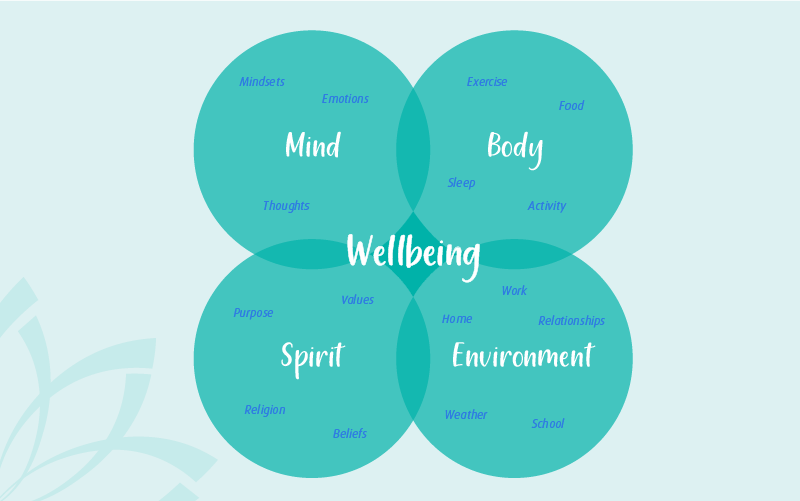For overall health and wellbeing, it’s important that we look at our lives as a whole.
Four key elements which play a role in our wellbeing are our mind, body, spirit, and our environment (including our relationships).
Not only do each play a key role, but all four are interconnected – so when one is out of whack, we’ll likely see that the others are affected, too.
When we’re struggling with one aspect of our wellbeing, or when we’re just not feeling up to scratch, it can be useful to take a step back and assess our mind (our thoughts and feelings), our body, our spirit, and our environment to see what we can do to improve our own wellbeing.

Healthy mind
We all know the feeling of shaky hands and sweaty palms when we’re feeling nervous.
This is just one small example of how our thoughts and feelings have an impact on our body.
On a larger scale, heightened stress or anxiety can lead to a panic attack, where some people experience physical symptoms such as shortness of breath / hyperventilation, chest pain, and numbness in the arms or legs.
And people experiencing depression may feel lethargy and tiredness.
Stress, anxiety and depression can also lead to conflict or strain in relationships with our spouse, our family members, or our friends.
To get in tune with your mental health, ask yourself:
- How often in the past two weeks have I felt stressed, anxious or on edge?
- How often have I not been able to stop worrying, or how often have I felt down or hopeless?
- Have I found pleasure in doing things I enjoy, such as hobbies or meeting up with friends? Or have I had little interest in doing things that would usually make me happy?
When we’ve been feeling stressed or down, it can be difficult to open up to someone or ask for help. But no one should have to carry their burdens alone.
Talking to someone about our worries can feel like a weight lifted off your shoulders, so we might consider talking to a trusted friend or family member, our GP, or a mental health professional.
Healthy body
Research tells us that adequate sleep, activity, and a balanced diet can improve mental wellbeing, and can also help us manage mental health problems.
When we’re busy or stressed, or when we’re feeling down, we may not look after our physical health as well as we could.
For some people struggling with acute anxiety or depression, even getting out of bed, eating and showering can be difficult or impossible.
But every small thing we can do, counts.
If you’re unable to cook a meal, it’s better to eat something rather than eating nothing at all.
If you’re unable to sleep or sleep well, laying down and letting your body rest is better than no rest.
And if you’re unable to exercise, just walking to the letterbox, or dancing in your room, can make a significant difference to how you’re feeling both mentally and physically.
To check in with your physical wellbeing, ask yourself:
- How often have I had adequate sleep in the past two weeks – enough so that I didn’t feel tired when I woke up?
- How often have I done some form of exercise, or physical activity where I worked up a sweat?
- And how often have I missed meals?
If we can do little things to improve our sleep, to get active, or to make sure we don’t skip meals, it can make a big difference to our wellbeing.

Healthy spirit
Spirituality is often associated with religion and faith, but spirituality has a much broader meaning which can apply to people of all religions/faiths and people of no faith, too.
We can look at spirituality as having a life with meaning or purpose. What gets you up in the morning? What makes you feel whole? What are your beliefs and values?
When we’re feeling down or stressed, or when we’re struggling with illness, we might feel a stronger connection to our spirituality, or we may feel disconnected from it.
To connect and check in with our spirit, we can use the Japanese concept of Ikigai to ask ourselves:
- What do I love?
- What am I good at?
- What does the world need?
- What contribution can I make to the community, based on my answers above?
Finding meaning in our lives contributes to feelings of happiness and fulfilment, which in turn influences our wellbeing.
Healthy environment
There are so many elements of our environment which can have an impact on our wellbeing – the house we live in; our relationships; our work or school environment; and even the weather!
For overall health and wellbeing, it’s important that we maintain healthy and positive relationships, and that wherever we are, we feel safe and secure.
Environmental factors that we may not take into consideration when thinking about our wellbeing, but which can have a big impact, include air quality, temperature, scents and smells, colour and lighting within our spaces, and design and layout (including the amount of space we have).
So check in with yourself and ask:
- Do I feel safe and happy in my home?
- Do I feel valued at work, and do I work in an environment which encourages me to work well and reach my potential?
- Are my friends and family supportive of me, and can I turn to any of them when I need support?
Sometimes we can improve the environment we live and work in easily – for example, we can hang up photos on the walls, open the blinds to let sunlight in, or light a candle.
But sometimes improving our environment can mean having a conversation with someone, be it a manager at work, our spouse, or a friend.
If we don’t have the ability to improve our environment ourselves, communication with others becomes vital to communicate our needs for our wellbeing.
Remember, there is always help just around the corner.
For mental health support, consider speaking with one of our counsellors.
Or for mental health crisis support, contact:
Liz Gellel | Marketing Coordinator – Digital Lead
Read more: